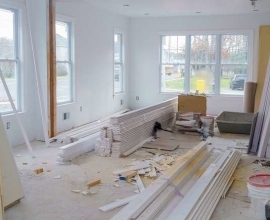Read This Before You Renovate Your Home
Renovating your home is a great way to increase its value and make your space more pleasant to live in. But while there are plenty of good reasons to embark on the various home improvement projects you have on your list, one thing you should know is that in the course of upgrading your space, you could wind up with a higher property tax bill on your hands. And that’s an expense you’ll need to plan for.
What do home improvements have to do with property taxes?
Your property taxes are determined by taking the assessed value of your home and multiplying it by your local tax rate. If your home is worth $300,000 and your property tax rate is 2%, you’re looking at an annual property tax bill of $6,000.
There are different factors that go into assessing your home, such as its size and the amount of land you have attached to it, but the condition of your home can also factor into its assessed value. So if you make improvements that substantially raise the value of your home, your tax bill could climb as a result.
What improvements might increase your property taxes the most? Basically, anything that makes your home worth a lot more than it could currently sell for.
Imagine you have an unfinished 800-square-foot basement. If you spend $20,000 to finish that space, which, in turn, adds $20,000 to your home’s value, then your property taxes are likely to rise once your home is assessed following that renovation. The same holds true if you install a patio, deck, or any other structure that’s considered an improvement.
Now on the flip side, if you put in new kitchen cabinet hardware, or replace worn carpet with newer carpet in your kids’ bedrooms, that generally will not impact your home’s value from an assessment standpoint. But a huge bathroom remodel could result in a higher property tax bill.
How will your local tax assessor know you’ve made improvements? Some towns send an actual assessor to your home at preset intervals, whether it’s annually, once every other year, or on a different timeline. At that time, you’re generally required to allow that assessor access to your home so he or she can note any improvements or changes that may have been made.
Another thing: For major renovations or construction projects (such as finishing a basement or installing a deck), you’ll generally need to obtain a permit to do that work. Your local assessor can access permit records, see if you’ve been making improvements, and hike up your property taxes accordingly.
Prepare to pay up
Though a higher property tax bill can, unfortunately, be a byproduct of home renovations, it may be a worthwhile expense to contend with. Imagine you update your home to the point where its value increases by $50,000. If your property tax rate is 2%, you’re looking at an extra $1,000 a year. That’s clearly not a small amount of money, but if those renovations make your home considerably more comfortable, it may be worth an extra $83 a month.
Also, don’t forget that property taxes are still deductible on tax returns, provided you itemize. As such, a modest tax hike might sting at first but result in a higher write-off, letting you recoup some of the extra money you paid.
Better Returns – half the volatility. Join Mogul Today
Whether over the 21st century, the past 50 years… Or all the way back to more than 100 years… Real estate returns exceed stocks with SIGNIFICANTLY less volatility! In fact, since the early 1970’s real estate has beat the stock market nearly 2:1.
That’s why we launched Mogul, a breakthrough service designed to help you take advantage of this critical asset class. With volatility spiking, Mogul members have been receiving investing alerts with projected rates of return of 16.1%, 19.4%, even 23.9%, and cash yields of up to 12%! And these aren’t in some ‘moonshot’ penny stocks or biotechs, but more stable multi-year real estate developments that don’t see their value swing on a daily basis like the stock market.
Source: https://bit.ly/2TXxAdl







